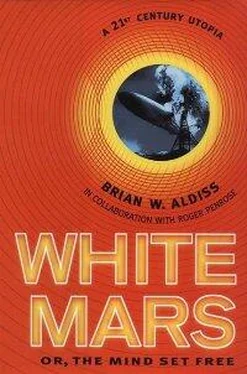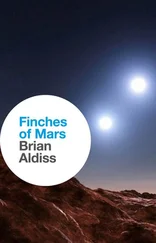Brian Aldiss - White Mars
Здесь есть возможность читать онлайн «Brian Aldiss - White Mars» весь текст электронной книги совершенно бесплатно (целиком полную версию без сокращений). В некоторых случаях можно слушать аудио, скачать через торрент в формате fb2 и присутствует краткое содержание. Год выпуска: 1999, ISBN: 1999, Издательство: Little, Brown UK, Жанр: Фантастика и фэнтези, на английском языке. Описание произведения, (предисловие) а так же отзывы посетителей доступны на портале библиотеки ЛибКат.
- Название:White Mars
- Автор:
- Издательство:Little, Brown UK
- Жанр:
- Год:1999
- ISBN:0-316-85243-0
- Рейтинг книги:5 / 5. Голосов: 1
-
Избранное:Добавить в избранное
- Отзывы:
-
Ваша оценка:
- 100
- 1
- 2
- 3
- 4
- 5
White Mars: краткое содержание, описание и аннотация
Предлагаем к чтению аннотацию, описание, краткое содержание или предисловие (зависит от того, что написал сам автор книги «White Mars»). Если вы не нашли необходимую информацию о книге — напишите в комментариях, мы постараемся отыскать её.
White Mars — читать онлайн бесплатно полную книгу (весь текст) целиком
Ниже представлен текст книги, разбитый по страницам. Система сохранения места последней прочитанной страницы, позволяет с удобством читать онлайн бесплатно книгу «White Mars», без необходимости каждый раз заново искать на чём Вы остановились. Поставьте закладку, и сможете в любой момент перейти на страницу, на которой закончили чтение.
Интервал:
Закладка:
“Mother Teresa! It was as though we had discovered a row of galaxies on our doorstep!” As if he could not stop himself, he added, “The remarkable Miss Chin is still alive and working. I happen to know her daughter.”
Something in Jon’s manner, in his very body language, suggested to me that this lady must have been his Chinese lover, back on Earth.
Euclid: “You cannot forever go on building bigger and bigger machines. So why did not the physicists just give up on the mystery?”
“Well, we don’t give up easily.” He shot me a glance as he said this. “It was hoped that once the gamma-smudge was found, then the mystery of mass could be resolved after all.”
Euclid. “So they built an even bigger super-duper collider, did they? Where this time? Siberia?”
“On the Moon.”
He showed a vidslide of a gleaming section of tube crawling across the Mare Imbrium.
“A collider that formed a ring completely round the lunar surface. Alas for ambition! The Luna project turned out to be a total failure, at least with regard to finding the gamma-smudge. It did produce some data, relatively minor but useful. But no new smudge.”
Euclid: “A costly mistake, wasn’t it? Why did it fail?”
“The bill all merged into Lunar expenses, when the Moon was the flavour of the year, in the late 2030s. After a host of teething troubles, the Luna Collider appeared to do more or less what it was intended to do.
“I guess the final disaster rested with nature herself. She just didn’t come up with a smudge—not even with the fantastic energy range available to a collider of that size.”
Euclid: “Why didn’t that kill off the whole idea? But you are about to tell us that after that disaster, funding was found to start all over again here— on Mars?”
“Politics came into it. The fact that Mars was a UN protectorate made it tempting. Also, there is the precept that even pure science, however expensive it may seem, pays off in the unforeseen end. Consider the case of genetically mutated crops, and how they have contributed to human longevity. Some people are willing to pay for ever-widening horizons, for freeing the human mind from old shibboleths.
“And there were two further chunks of scientific progress to encourage them—and another different kind of development which had been brewing away for some while earlier.”
Euclid: “They were?”
“Even last century, a number of theoreticians had realised that the enigma of mass could not be resolved at the energy levels relevant to the Higgs. Why? Well, the very concept of mass is all tied up with gravitation. Gravitation … Let me give you an analogy, Euclid.
“Another long-standing ‘mystery’ in particle physics is the mystery of electrical charge. It’s a mystery of a sort let’s say, although a good number of physicists would claim they understand why electric charge comes about.
“The trouble is that although there are good reasons why electric charge always comes in whole-number multiples of one basic charge—which is one twelfth of the charge of an electron—there’s no real understanding why the basic charge has the particular value it happens to have.
“I should say there was a time, late last century, when this basic value was believed to be one third of the electron’s charge. Before that it was held to be the electron’s charge itself. But the one-third value is the quark charge, and it was still thought that quarks were fundamental. Only after Henry M’Bokoko’s theory of leptons and pseudo-leptons was it realised there were yet more elementary entities. Things called kliks and pseudo-kliks underlay these particles in the same way quarks underlie the hadrons.
“These kliks, pseudo-kliks and quarks, taken together, gave rise to the basic one-twelfth charge that we know today. A diagram will make that clear.”
He flashed a vidslide in the air. It hung before the audience, a skeletal Rubik’s cube in three dimensions.
“Now, there are certain fundamental ‘natural units’ for the universe—the units Nature herself uses to measure things in the universe. Sometimes these are called Planck units, after the German physicist who formulated them in the early years of last century.
“You see how one finding builds on the previous one. That’s part of the fascination which keeps scientists working. In terms of these units, the basic value of the electric charge turns out to be the number 0.007, or thereabouts. This number has never been properly explained. So we don’t, even yet, properly understand electric charge. There is, indeed, still a charge mystery. End of analogy!”
Euclid, unblinkingly: “So what follows?”
“The point about the mass mystery—a point made by a few physicists even as long ago as last century—was that no one would seriously attempt to find a fundamental solution to the charge mystery without bringing the electric field into consideration. Electric charge is the source of the electric field. In the same way, so the argument went, it made little sense trying to solve the mystery of mass without bringing in the gravitational field. Mass is, of course, the source of the gravitational field.
“And yet, you see, the original hopes of resolving the mystery of mass in terms of finding the Higgs particle made absolutely no reference to gravitation.”
Euclid: “What do you make of all this?”
“It was really a whole bag of wishful thinking. You see, Euclid, finding the Higgs particle was considered just about within the capabilities of the physicists of the time. So, if a solution to the mystery of mass could be found that way—why, then it would have been pretty well within their grasp.
“But if the issue of the role of gravity had to be seriously faced—there would not have been a hope in Hell of their finding an answer to the origin of mass experimentally. They were looking for God with a candle!
“The energy required would have been what we call the Planck energy—which is larger than the Higgs energy by a factor of at least—well, if we said a few thousand million million, we wouldn’t be far out.
“Put it this way. Even a collider the length of the Earth’s orbit would not have been enough.” His young-old face broke into a broad grin at the thought of it.
Euclid: “Yet you tell us that they still did not give up. Why is that?”
“As I told you, it was all wishful thinking. They believed that finding the Higgs would be enough. Anyhow, science often proceeds by being over-optimistic. It’s a way in which things do eventually get done. Eventually.
“So although the mass mystery remains unsolved, we now think our project here could well be close to doing so.”
Euclid: “More over-optimism?”
“No, this time the case is pretty convincing. The thing is that we are now really facing up to the Planck energy problem.”
Euclid: “I may be only an android, but as far as I know our experiment does not involve a collider of anything like that length. Or any collider at all.”
Jon released a 3D projection of something like a dark matrix motorway into the lecture room. He let it hang there as he spoke. On that infinite road, smudges shot off endlessly into distance. A cloud of other coloured spots sped after them.
“We’re looking at a VR projection of a succession of different smudges, alpha-, beta-, gamma-, delta-smudges. Artist’s impression only, of course. You’re right, we have no collider on Mars. I’ve said there were a couple of encouraging breakthroughs. Those breakthroughs make our Mars project possible.
“First breakthrough. The realisation that there was no point in working through this whole gamut of smudges, at greater and greater energy levels, the list continuing for ever.”
Читать дальшеИнтервал:
Закладка:
Похожие книги на «White Mars»
Представляем Вашему вниманию похожие книги на «White Mars» списком для выбора. Мы отобрали схожую по названию и смыслу литературу в надежде предоставить читателям больше вариантов отыскать новые, интересные, ещё непрочитанные произведения.
Обсуждение, отзывы о книге «White Mars» и просто собственные мнения читателей. Оставьте ваши комментарии, напишите, что Вы думаете о произведении, его смысле или главных героях. Укажите что конкретно понравилось, а что нет, и почему Вы так считаете.










